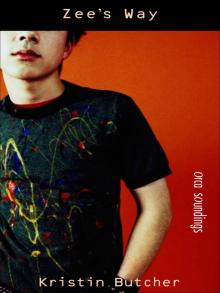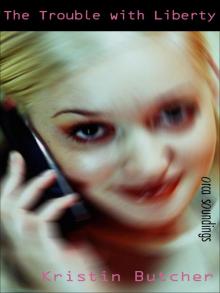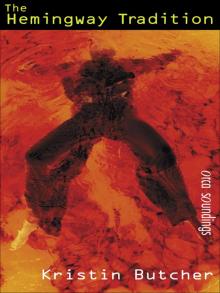- Home
- Kristen Butcher
Zee's Way Page 4
Zee's Way Read online
Page 4
After that, the painting went better. The morning was really heating up, and I was sweating like crazy, but at least I could see what I was doing.
Around 10:15, Feniuk came to check on me.
“Here,” he said, holding out a can of pop. Water droplets rolled down the sides and splashed onto the sidewalk. Suddenly I was dying of thirst.
“What’s this?” I said.
“What does it look like?” Feniuk pushed the can into my hands. “It’s a drink. Take it.”
“Why are you giving it to me?” I asked suspiciously.
He shrugged. “The government has strict rules about working conditions for employees. You’re entitled to a break.” Then he turned around and headed back into the store.
By eleven o’clock I had the mural outlined on the wall—the basics anyway. It wouldn’t seem like much to anyone else, but it was the skeleton I needed, and I was looking forward to starting the actual painting.
So when I headed into the hardware store to return Feniuk’s sunglasses and wash out my paint things, I was feeling pretty good.
Until I overheard Mrs. Costello from the flower shop giving Feniuk a piece of her mind.
“You’re a fool, Sam Feniuk,” she was saying. “What you should be doing is calling the police. The boy is a hoodlum. Hasn’t he proven that? He’s going to rob you blind—or worse! Mark my words. Leo is right. Young people these days can’t be trusted. Call the police before it’s too late.”
Chapter Nine
When I heard that, I felt like a race-car driver who’s just bounced off a brick wall. I was totally stunned. And that’s because during the last three hours—for the first time all summer—I hadn’t been thinking about the war with Feniuk and the other merchants. That morning the only thing I’d had on my mind was the mural. I’d been so wrapped up in planning it out that I’d forgotten I was being forced to do it.
But Mrs. Costello’s words jolted me back to reality. I wouldn’t forget again.
“She really said that?” Benny’s eyes widened with disbelief when I told the guys what I’d heard.
“Why are you so surprised?” Mike snorted. “We’ve known all along the store-keepers hate us.”
“So let’s give them a reason,” Danny said.
“What kind of reason?” It was Benny again.
“Well, you know how Old Lady Costello puts buckets of flowers outside her shop during the day?”
We all nodded.
“What if we cut off all the tops so that only the stems are left?”
“Good one,” Mike snickered.
“Better yet, why don’t we just make a switch?” Horace suggested with a grin. “You know—weeds for flowers. You think people will pay $6.99 for a bunch of dandelions?”
We all laughed.
Then I got serious again. “But if we do any of that stuff, Feniuk might start thinking Mrs. Costello is right.”
“Don’t you think he already does?” Danny looked amazed.
I shrugged. “I guess, but he doesn’t seem quite as determined to get us thrown in jail as Jackman and the others do. When he caught me doing the graffiti, he could’ve called the police, but he didn’t. And he has kept his word about not telling my dad.”
“So far,” Mike replied skeptically. “But that could just be a trick. He might be sucking you in. Maybe he’s waiting for you to finish the mural before he rats on you.”
I shook my head. “I don’t think so.”
I had no idea why I was sticking up for Feniuk. I was as frustrated with the merchants as the other guys were. They’d done nothing but hassle us since the shopping center opened. It’s just that I knew what it felt like to be judged unfairly, and I didn’t want to do it to somebody else—not even Feniuk.
“I guess we’ll just have to see what happens,” Horace said. “Let Feniuk make the next move.”
That was fine for Horace to say. He wasn’t the one who’d have to answer to the cops and my dad if Feniuk did do something. But since I had no control over that, I just kept showing up at the hardware store and working on the mural.
By the third day, things were starting to come together. The mural was growing into a storefront. It didn’t look like any of the stores in Fairhaven—no sense getting the merchants suspicious—but it still looked like a store.
Using a technique called trompe l’oeil, which literally tricks the eye into thinking a flat surface is three-dimensional, I painted a blue-and-yellow-striped awning the length of the wall. It looked so real it seemed to pop right out from the building. On each side of the door I put display windows. I drew a No Littering sign on the wall, and under it I placed a trashcan. On the ground beside that I painted a candy wrapper, some crumpled paper and a discarded drink box. The end of the wall near the corner was the perfect spot for a big red mailbox. I even added some graffiti to it. At the other end—for balance—I put a fire hydrant, and just for laughs I included a dog sniffing it.
That’s what I was working on when I suddenly got this feeling someone was watching me. I looked around.
Mrs. Costello was standing on the boulevard behind me. I had no idea how long she’d been there—or even how she got there without me noticing. But she was there. And after what she’d told Feniuk—young people can’t be trusted—it gave me the creeps to have her watching my every move.
It was like she was waiting for me to screw up. I was tempted to paint the fire hydrant purple just to freak her out.
But I didn’t. Even though it would have been fun to see her have a fit, I knew I could wait a few more days for that. Soon I’d be ready to put people into my mural, and that was bound to stir up a few of the merchants—including Mrs. Costello. I couldn’t help wondering how she was going to like seeing herself on the wall. Just the thought of it made me smile.
From the corner of my eye I could see her walking along the boulevard. Every couple of feet she’d stop and study the mural. Then she’d move on again. When she got to the end, she turned around and retraced her steps, staring at the wall the whole way.
Once back to where she’d started, Mrs. Costello stopped. She cleared her throat.
I kept painting.
She cleared her throat again.
I still kept painting.
“You’re a very good artist,” she said.
I stopped painting.
My ears must have been playing tricks on me. That sounded just like a compliment, and Mrs. Costello was the last person I expected to get one of those from. There had to be a catch.
She looked up and down the wall. “What you’ve done here is beautiful. It looks so real.” Then she turned back to me. “You are very talented.”
I squinted up at her, waiting for the other shoe to drop.
Her forehead buckled into a frown. “So tell me why—why, if you can paint like this,” she flung her arms toward the mural, “why on earth would you scribble dirty words like a five-year-old?” She shook her head. “I don’t understand.”
Then she started to walk away. She didn’t even wait for an answer. She just said her bit and took off. It was like I wasn’t there—like she’d been talking to herself.
And that made me mad. I dropped my paintbrush and jumped up.
“Do you want to?” I threw the question at her back.
She turned around.
“What?”
“Do you want to understand? You just said you didn’t know why I did the graffiti. Do you want me to tell you?”
Her body shifted backwards, like she was going to run.
“Look,” I said, getting right to the point, “you asked a question. I’m asking you if you want an answer. Or do you even care what my reasons were?”
She had to have heard me—I was only two feet away from her. But she didn’t say a word. She didn’t even blink. She could have been a statue.
I shook my head. I was obviously wasting my breath.
“I didn’t think so,” I muttered and went back to work.
Chapter Ten
The next day was Saturday, and because I didn’t work for Feniuk on the weekend, that meant I didn’t have to get up early. I could lie in bed as long as I wanted.
It was the toilet flushing that woke me. Of course, as soon as my brain registered the sound, I drifted back to sleep, and the next time I surfaced, everything was quiet again. The thing that brought me back to consciousness permanently was the front door.
Slam! My body jerked and my eyes flew open. I squinted at the clock. It was 10:40. I had at least another good hour of sleep left in me.
Then the bedroom door burst open and the room started to vibrate. “Get up, you lazy slug,” Dad boomed.
The words and volume were familiar, but the voice was way too cheerful. I cracked open an eye to make sure it was really my dad. I was still pretty groggy, but I could have sworn he was smiling.
I rolled over and put the pillow over my head. Dad pulled it away.
“Come on,” he said again, jostling the bed with his knee. “Get up. I need you to help me.”
“With what?” I mumbled into my mattress, making a last-ditch effort to hang onto sleep.
He ripped back the blankets. “With our new TV. I need you to help me carry it in.”
Not only had Dad bought a new television, but a VCR too. As we carted them into the house, he informed me a satellite dish would be arriving on Wednesday.
My jaw just about hit the floor. I’d been trying to talk him into one of those for the last couple of years. “But –”
“I know what you’re going to say,” he cut me off. “But that was before, when we just had the old TV. It’s different now. I mean, what’s the point of having high-tech equipment if we can’t get any channels? Right?”
He didn’t wait for me to answer. Instead, he strode across the living room. “First thing we need to do is clear some space. Help me move this stuff out of the way.”
Then he began dismantling Mom’s music corner—chair, stand, sheet music, CDs, symphony programs—everything. For a year that corner had practically been a shrine, and now Dad was tearing it apart like a one-man wrecking crew.
At the risk of ruining his good mood, I said, “Are you sure you want to do that?”
He looked up. He wasn’t smiling anymore. But when he spoke, he wasn’t yelling either. His voice was quiet and matter-of-fact. “You said it yourself, son. She’s not coming back.”
It was true. I had said that. For a whole year I’d been telling myself she wasn’t coming back. My mother had cut me out of her life, so I had cut her out of mine.
“But what if she does?” I heard myself reply.
It was weird how that turned out. Dad finally stopped pretending Mom wasn’t gone, and I stopped acting like she’d never been there. So suddenly we weren’t on opposite sides anymore. And that meant we didn’t have to be mad at each other all the time. The situation hadn’t really changed, but our way of looking at it had. And for some reason that seemed to make a difference.
It made a difference in other things too. Like the mural. When I checked it out on Monday, it didn’t look the same. Don’t get me wrong—nobody had messed with it. What was there looked just like it had on Friday. It was the stuff I hadn’t painted that was causing the problem. Usually I don’t have any trouble visualizing the things I’m going to draw. But that morning everything was a blur.
As I stood on the sidewalk trying to get my ideas to focus, Feniuk came around the corner of the building.
Walking toward me, he called, “So what’s on the agenda today?”
Up to that point he’d let me do whatever I wanted, so his question surprised me. Maybe he’d guessed what I was planning. I eyed him warily. “Don’t you trust me?”
He frowned. “It has nothing to do with trust. I’m just interested.”
“I haven’t decided yet,” I hedged. Since I was having trouble visualizing images in my head, it was sort of the truth.
“Fair enough.” He started back to the store. But then he stopped and turned around again. “Can I ask you something?”
What was it with adults? They were always asking questions.
“What?”
“When you’re done here, how are we going to make sure you won’t be buying anymore spray paint?”
I hadn’t seen that one coming. So I didn’t have an answer—at least not right away. My graffiti days were over, but I didn’t want Feniuk to know that.
I shrugged. “Just don’t sell it to me, I guess.”
He shook his head. “You’d just get it somewhere else. I suppose what I’m really asking is what it’s going to take to end the war between us.”
This was unreal! The old man had zinged me again. I stared hard at him, trying to decide if he was serious. He looked like he was. I couldn’t believe it. This was the chance I’d been waiting for. Finally somebody was willing to listen.
The only problem was that my thoughts were spinning so fast I couldn’t sort them out. The guys and I had a lot of beefs. Where was I supposed to begin?
I must have been taking too long to decide, because suddenly Feniuk was talking again. “I know you and your friends think you’ve been treated unfairly, and in some ways you have.”
“In some ways!” I went off like a fire-cracker. “How about in every way? You storekeepers have had it in for us from the very beginning. You never even gave us a chance. You just took one look at our clothes and hair and decided we were no good!”
Feniuk sighed. “I know it seems that way.”
“It is that way!”
He shook his head. “No, it isn’t. Not completely. I admit we kept an eye on you, but we were just being careful. The newspapers are filled with stories about women and seniors being attacked by teenagers. That’s all we were thinking about. You may not realize it, but when you boys are together, you’re a pretty intimidating group. The gang of you parked outside a store scares people away.”
“But we never did anything,” I argued. “We never hurt anybody. We don’t do that kind of stuff.”
“What about the broken window at Jackman’s Market? Are you going to tell me you didn’t do that?”
“That was an accident.”
“So why did you run?”
I shook my head in disgust. “What choice did we have? We knew you wouldn’t believe us. And you didn’t, did you?”
He seemed to think about that for a while. Then he said, “What about the graffiti?”
“That was after,” I grumbled.
“After what?”
“After you banned us from the shopping center. After you sicced the police on us. After we knew you were never going to listen.”
Feniuk frowned. “Never’s a long time. I’m listening now.”
Chapter Eleven
The angrier Mike got, the faster he walked. The rest of us practically had to run to keep up.
“It’s a crock!” He took his temper out on a stone. It ricocheted off a lamp standard and skittered onto the boulevard. Mike ignored it and kept walking. He hung a left at the corner.
“Why do you say that?” Danny called after him.
Mike didn’t even bother to look back. “They’re not going to change their minds.”
“What makes you so sure?”
Mike spun around. “Have you forgotten? They hate us!”
“Maybe not,” Horace said. “Maybe they’re just afraid of us. If what Feniuk told Zee is true, Jackman and the others didn’t intend this thing to snowball out of control any more than we did.”
Mike’s eyes widened. “Don’t tell me you’re on their side now too!”
I felt my back stiffen. Mike still thought I was a traitor for painting the mural.
I decided to turn the tables. “You act like you don’t want this war to end.”
He shot me a dirty look.
“Feniuk said he’d talk to the other merchants—explain our side,” I pointed out for at least the fifth time. “He understands that we’re not hanging around to cause trouble. A
ny stuff we’ve done was either an accident or self-defense. Feniuk is pretty sure he can make the other merchants see that.”
I looked around at the group. Everyone seemed to be waiting for somebody else to do the talking.
As usual, it was Horace. He shrugged. “Okay—so we give it a few days. What have we got to lose?”
Horace had stuck his neck out for me with the other guys, but I don’t know that he was any more convinced. It seemed like I was the only one who thought things were going to work out. Maybe it’s because I’d been part of the negotiations. I’d been around Feniuk for nearly two weeks and I knew what he was like. Though the two of us might not see eye to eye on everything, I was pretty sure the old man would keep his word. But, of course, my friends couldn’t know that. All they had to go by was me. And considering I was spending almost as much time with Feniuk as I was with them, I could understand why they were nervous.
I wished things would hurry up and get settled. I hated being stuck in the middle. But after two days, nothing had changed. Well, actually there had been one change, but that had nothing to do with the guys and me. At least I don’t think it did.
Bernie’s Shoe Repair had gone out of business. Overnight the space had been cleared out and there was a For Lease sign in the window. Not a surprise really—if you think how many people wear runners these days. I might have thought my friends and I had scared him away, but none of us had ever even gone into that store. I guess nobody else had either.
As for the mural, it was finally starting to look like something, though not exactly what I’d planned. To one side of the door I’d painted a handful of merchants—Mrs. Costello, Bingham from the pharmacy, the guy who owned the hair salon, the Loonie Bin lady and, of course, Jackman. But instead of making them look mean and nasty and evil like I’d intended, I turned them into caricatures. They didn’t totally look like themselves, but anyone who shopped at Fairhaven would recognize them and have a laugh.

 Zee's Way
Zee's Way Trouble With Liberty
Trouble With Liberty Chat Room
Chat Room Hemingway Tradition
Hemingway Tradition